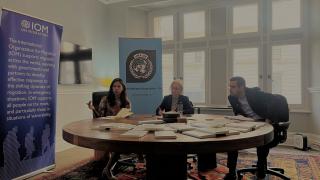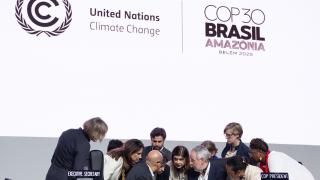
On 18 June 2024 UNA-UK co-hosted a breakfast briefing with the International Organization for Migration (IOM) marking the start of Refugee Week, looking at the work of IOM's vital The Missing Migrants Project. The project began in 2014, after two tragic shipwrecks that claimed the lives of more than 600 people off the coast of the Italian island of Lampedusa.
Every year thousands of people die while fleeing violence, poverty and the impact of climate change, crossing the English Channel or the Sahara Desert. Yet there is little information about the true scale of the problem and who these migrants are. To address this the IOM has been working worldwide with migrants, NGOs, governments, the media and people working with migrants on the ground to build a picture of fatalities that happen during migration. In the last ten years alone more than 66,000 deaths during migration have been recorded by IOM; this figure is conservative due to the challenges with collecting information. The project remains the only global open-access database of migrant deaths and disappearances.
Christa Rottenstein, Chief of Mission of IOM UK opened the event, explaining the work of IOM. Missing Migrants Project Coordinator, Andrea García Borja presented a summary of the last decade of data, its methodology and impact, while stressing that each piece of data must be respected as a real person with family and a past life rather than just as a statistic.
We then heard from Ahmad Al-Rashid, IOM UK Cross-cultural facilitator Team Lead, who spoke about his own experience fleeing from Syria in 2012, crossing borders into other dangerous countries and finally into the UK. He called for safe, legal passages and coordination between nations, so that those seeking safety would not have to rely on traffickers as their only way of getting out of lethal situations.
The briefing concluded with questions from the floor including on how receptive policy makers were to using the data and in what context, and if there can ever be a 'deterrent' when people are trying to escape death or danger or trying to reach family or a community.
Read more:
- You can learn more about the work of IOM here
- And read UNA-UK’s 2018 briefing on the Global Compact on Migration here
Photo: Andrea García Borja, Christa Rottenstein and Ahmad Al-Rashid brief on the IOM's work.






